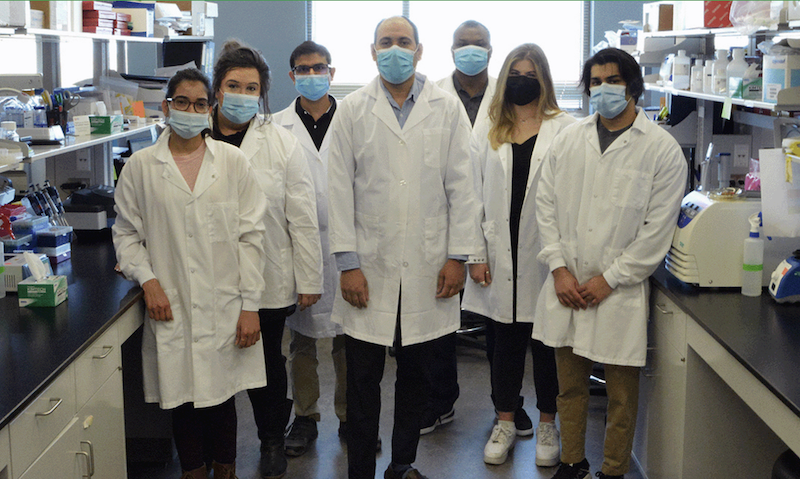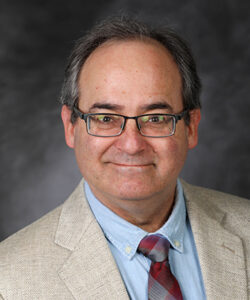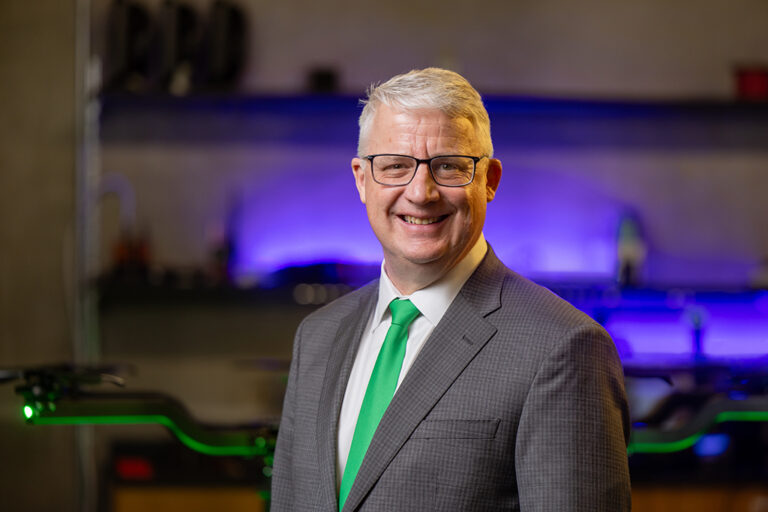The goal: ‘Golden arrow’ vaccines
Biomedical Sciences researchers at UND help develop vaccines for bacterial pneumonia, COVID-19

For veteran researchers especially, the race to develop effective immunizations against viral and bacterial infections can feel never-ending.
Just ask Nadeem Khan, Ph.D., associate professor in the Department of Biomedical Sciences at UND’s School of Medicine & Health Sciences. For every successful SARS-CoV-2 (COVID-19), polio, or smallpox vaccine, he says, countless more infections await inaugural or better immunization options.
Bacterial pneumonia, in particular, has been a tough nut to crack.
“I’m a vaccine immunologist by training. I’ve worked on several pneumococcal vaccines before that were supposed to protect against all bacterial types or strains,” Khan explains, speaking of pneumococcus or Streptococcus pneumoniae, one of the major pathogens that cause bacterial pneumonia, “but none have been successful in clinical trials.”
If Khan has his way, though, the fight against pneumonia may just be turning a corner. And he’s hoping that UND will soon be playing a key role in that turn.
Research funding public…
The researcher was, after all, recently awarded two grants totaling more than $600,000 that are expected to expand the arsenal physicians and public health officials can use in the fight against such infections.
The first grant, a two-year, $387,750 award from the National Institute of Health’s National Institute of Allergy and Infectious Diseases (NIAID), is designed to bolster Khan’s new adjuvanted vaccine targeting Streptococcus pneumoniae.
“There are vaccines available to counter [pneumonia], but the problem is that this bacterium exists in more than 90 types, called serotypes,” Khan adds. “The vaccines currently available on the market cover only 13 of those strains. So we have 70-plus bacteria within that pool that remain uncovered.”
Khan hopes his vaccine will reduce that number.
According to the Centers for Disease Control and Prevention (CDC), although the incidence of invasive pneumococcal disease dropped dramatically in the United States following the introduction of a variety of pneumococcal vaccines starting in the 1980s, the infection still occurs. And it can be devastating for the elderly or those with compromised immune systems or conditions like asthma, chronic obstructive pulmonary disease (COPD), and lung cancer.
Furthermore, challenging researchers in their attempts to arrest the more than 70 outstanding strains of pneumococcus is the fact that bacteria continue to evolve—to the point of being able to resist not only antibiotic medications but some vaccines. In so far as bacterial evolution continues, then, so do efforts in the lab to keep up with changing pathogens.
Enter Khan, whose NIAID grant will study the role of enhanced T-cells in developing antibodies that do a better, more thorough job of killing the pneumonia-causing bacteria in a serotype-independent manner.
“The NIH has given my lab the resources to try to develop a vaccine that can work against all serotypes of bacteria, can fight all bacteria in the streptococcus pool,” he says. “So this is a step in that direction of proving the immunogenicity of those vaccines by giving them a stronger adjuvant effect. This is an advanced version of those vaccines that failed in clinical trial.”
The goal, says Khan, is that any vaccine developed in his lab would address the issue of bacterial diversity and could potentially be used as a “universal” vaccine effective against many more strains of bacterial pneumonia.
…And private
This effort to find a golden arrow for pneumonia builds upon a second grant Khan was awarded recently by Merck Pharmaceuticals—this time to the tune of $275,000.
Focusing on a well-known vaccine called pneumococcal conjugate vaccine 13 (PCV13)—which covers the 13 most significant pneumococcus strains that cause respiratory infections in adults and children, including pneumonia, bacterial sepsis, and common sinus and ear infections—Khan in this case is looking to boost the effectiveness of an extant product, expanding it from 13 to 15 serotypes.
“The company has added two additional strains [to its vaccine] that cover the newer types of bacteria that have emerged and that are significantly associated with these diseases, in the hope that they can fight the new bacteria,” Khan continues. “Our task is to compare the immunogenicity of those two new serotypes with serotypes that are part of the existing vaccine to see if they are as good as current vaccines. That’s the question we’ll be investigating over the next two years.”
The amended Merck vaccine is already going through one clinical trial, with others likely to follow.
Then there’s COVID
Both of Khan’s recent grants are a testament to his track record of success in vaccine development, which includes a SARS-CoV-2 prototype vaccine that Khan and his associates developed in 2020.
What makes his group’s coronavirus vaccine different from others on the market, says Khan, is that whereas the two most popular vaccines are mRNA based, his is an adjuvanted, protein-based vaccine, meaning it doesn’t require freezing temperatures to stay viable.
“Ours could be shelf stable at more moderate temps,” he says. “Not room temperature, but not as cold as the other COVID vaccines.”
And so far, so good. After seeing encouraging results in the laboratory, Khan is moving forward on “repeating the experiment” to confirm that human antibodies respond favorably to what might amount to a new weapon in the fight against coronavirus.
“It looks like our vaccine is producing a very strong immune response,” Khan says. “The next step is to use those results to see if we can target the main strain of the virus and two or three of the variants that emerged in California and the [United Kingdom]. We now have to show it can react with all variants.”
If he can do so, then what has felt like a never-ending pandemic to many of us, might also see a more definitive end sooner rather than later.
About the author:

Brian James Schill is Director of Alumni & Community Relations at the UND School of Medicine & Health Sciences.



